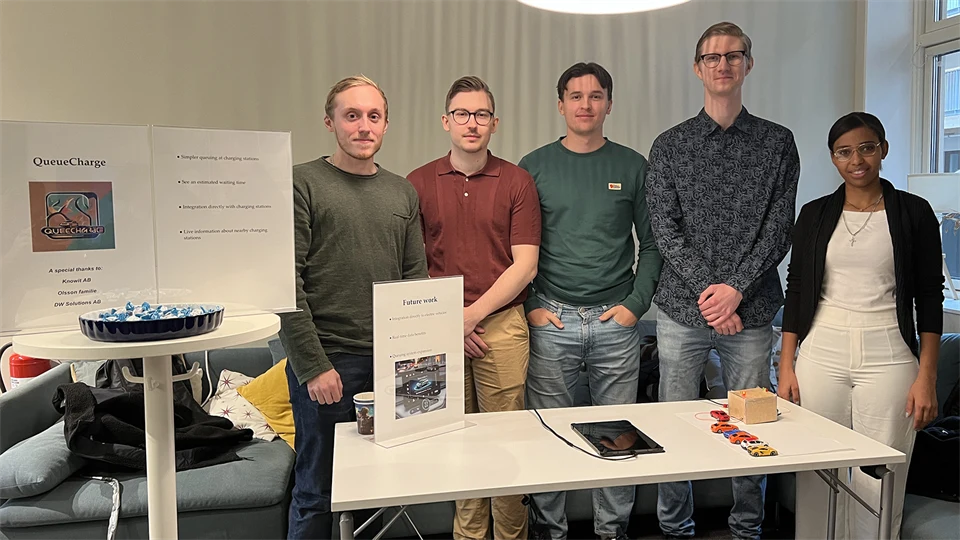Virtual queuing system at public electric car chargers – a SIMS project
During the SIMS course, Max, Oliver, Isak, Luwam and Ludvig have worked with an assignment together with Knowit AB. The task they were given was to find a need in the electric car market – the result was a virtual queuing system at public electric car chargers.
Concretize a concept and design a standard
The group worked against Knowit AB, an IT consultancy, which was their client. They were tasked with finding a need in the electric car market, where they finally landed on the idea of developing a virtual queuing system at public electric car chargers. The initial weeks of the project mainly consisted of scouting for ideas and identifying needs. To ensure that they are developing a product that the market is interested in, they conducted a customer survey that showed that their intended idea could be interesting to users.
The focus in the development phase was on fleshing out the concept and designing a standard for the queuing system that could be attractive to third-party manufacturers, including car companies. The application was designed to offer an intuitive user experience, with features such as real-time information on charging station availability, fair and transparent queue management.
Practical experience and valuable skills
– Working in projects together with students from different programs and directly with a company like Knowit AB has been a very useful experience. Applying what we learn during our studies to a real project was exciting and gave us a better understanding of how theory and practice can work together, says Max.
The collaboration with students from different fields of study contributed to them gaining access to a diversity of ideas and perspectives, which was valuable for the project's results. This multifaceted teamwork helped them to think more creatively and to find more informed solutions to the problems they encountered.
Working with a real company like Knowit AB was also very rewarding. It gave them insight into what businesses expect and how they could adapt solutions to meet customer expectations. Regular meetings with the company ensured that the work the group did was relevant and contributed to the client's needs.
– Sure, it was challenging to manage the project's timeframes and to collaborate effectively as a team, but these challenges were also important learning opportunities. The project not only gave us practical experience in handling real tasks, but also valuable skills in project management and collaboration, Ludvig continues.
Giving opportunity to apply our knowledge
The SIMS course is a practical and engaging course where students get to work in teams to come up with creative solutions to real problems. The groups are composed of students with different backgrounds and expertise, which gives a good mix of knowledge. The course lasts for 10 weeks and during that time the students have regular meetings with their clients, which can be anything from local organizations to larger social actors, to ensure that the solutions they develop really hit the spot.
– It is a rewarding opportunity to apply what we learn in the education directly in real projects, concludes Oliver.
